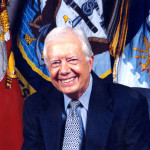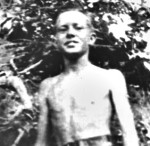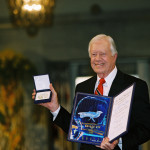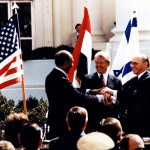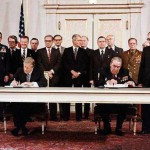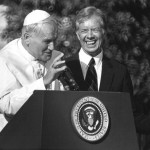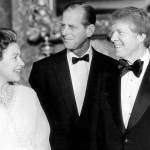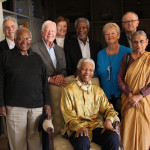Jimmy Carter (USA)
2002 Nobel Prize Laureate; the prize was awarded for his efforts to find peaceful solutions to the conflicts around the globe and struggle for human rights
«I am a Southerner and an American. I am a farmer, an engineer, a father and a husband, a Christian, a politician… a planner, a businessman, a nuclear physicist, a naval officer, a canoeist, and, among other things, a lover of Bob Dylan’s songs and Dylan Thomas’s poetry… We Americans are proud of such individuality…».
(Jimmy Carter))
In 2002, the Norwegian Nobel Committee in Oslo awarded the ex-president of USA Jimmy Carter with the Nobel Peace Prize.
Jimmy Carter was awarded this prestigious prize for his efforts to find peaceful solutions to international conflicts, to advance democracy and human rights. By awarding the Peace Prize to Carter, the Norwegian Nobel Committee emphasized the importance of solving the conflicts in the way of negotiations. In particular, the Nobel committee pointed out the outstanding achievement of president Carter in the peaceful solution of the conflict between Israel and Egypt. Camp David negotiations between the Egyptian president Anwar Sadat and Israeli Prime Minister Menahem Begin, at the mediation of the US President Jimmy Carter, resulted in the signing of a peace treaty, which put an end to the war between these two countries that lasted for 31 years. Egypt was the first of the Arab neighbours of Israel to make a peace treaty with the Jewish state. Israel returned the control over the Sinai peninsula to Egypt. The activity of the Carter Centre to support democracy and human rights in the whole world was also taken into account. Carter personally made a countless number of peacemaking visits around the whole world (Africa, Middle East, The Caribbean, North Korea), for which journalists gave him the nickname “the traveller-president.”
James Earl Carter Junior was born in the small farming town of Plains, Georgia. His father, sir James Earl Carter, known as Earl, was a farmer and businessman. His mother, Lillian Gordi was a certified medical nurse. When Jimmy Carter was four years old, the family moved to a farm in Archery, a nearby community. Jimmy Carter touchingly described the world of his childhood in his book An Hour Before Daylight: Memories of a Rural Boyhood, published in 2001. Although the Carter’s family suffered from the lack of electricity and running water, the Carters were one of the most well-to-do families in the community. Most of their neighbours, and the friends of young Jimmy in Archery, were African-Americans, but the rigid code of segregation demanded the separation of races in school, in church, and in other public places. Carter’s mother, Lillian, despised the tradition by volunteering her services as a midwife and nurse for their neighbours. His father, Earl, maintained the more traditional role of a southern landowner, eventually increasing his assets to four thousand acres, worked by mainly black tenant farmers. Earl Carter developed his business activities as a broker of peanuts, storekeeper, and retailer of farm supplies and equipment.
Jimmy Carter was educated in the public schools, and attended Georgia Southwestern College and Georgia Tech, before he joined the United States Navy Academy. He graduated with a Bachelor of Science degree. Soon after graduation, he married Rosalynn Smith, born in Plains, Georgia. After serving on conventional submarines both in the Atlantic and in the Pacific oceans, Carter joined the Navy’s pioneering nuclear submarine program. After graduate studies in nuclear physics at Union College in Schenectady, New York, Carter was selected by Admiral Hyman Rickover to serve as engineering officer of the Sea Wolf, America’s second nuclear submarine.
Carter had reached the rank of full Lieutenant when his military career was cut short by the death of his father. In 1953, Carter resigned his commission, and returned with his wife and three sons to Plains to run the family’s farm and continue his father’s warehouse business, selling fertilizer and farm supplies. Rosalynn, who initially resisted the move back to Plains, became the firm’s bookkeeper, and over the next years, Carter’s Warehouse grew into a profitable general-purpose seed and farm supply operation.
As Governor of Georgia, Carter worked hard to heal the state’s racial divisions, announcing in his inaugural address that “the time for racial discrimination is over.” It was an unprecedented statement for a Southern governor, but Carter made good on his words. He increased the number of African American state employees by 40 percent and hung portraits of Martin Luther King Jr. and other notable black Georgians in the state capitol.
The Watergate Scandal and the Vietnam War seemed part of the same system, a system that was the product of the estrangement of the government from the people and the betrayal of the principles of American democracy. He believed that the government was similar to human beings, and that the same morals norms that were a part of private life should also be followed in politics.
The presidential candidate evaluated the state of the American political system critically: “Our nation now has no understandable national purpose, no clearly defined goals, and no organizational mechanism to develop or achieve such purposes or goals. We move from one crisis to the next as if they were fads, even though the previous one hasn’t been solved. The Bible says: ‘If the trumpet give an uncertain sound, who shall prepare himself to the battle?’”
Carter’s campaign platform stood out for the clearness of its intentions. He proposed to reorganize and decrease the federal bureaucratic apparatus, create an “open government,” change the tax system, reform the healthcare system by making medical services more accessible; he promised to stop the unemployment and inflation caused by the energy crisis, to decrease the American military presence in the abroad by removing troops from Thailand, the Philippines, Japan, and South Korea, and to decrease spending on the military. What is more, Carter suggested that, “The biggest waste and danger of all is the unnecessary proliferation of atomic weapons throughout the world. Our ultimate goal should be the elimination of nuclear-weapon capability among all nations.”
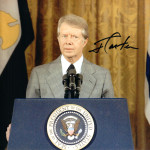
Autograph of the 39th President of U.S.A., Nobel Peace Prize Winner, Jimmy Carter. From my private collection
One of the most important goals of the new administration was to be the defence of human rights across the whole world, which meant, to a certain extent, a revolution in foreign policy.
Carter’s views on American politics in the sphere of human rights, expressed in his inaugural speech, were immediately noticed and appreciated by Soviet dissidents. As they were by the Soviet government.
The hopes of various groups of dissidents – religious activists, especially from Protestant groups, members of the movement seeking the emigration of Jews from the Soviet Union, and the Moscow human rights defenders – were closely connected to Carter’s presidency. Carter and others in his administration repeatedly expressed support for dissidents who were attacked by the secret service. In 1977 the famous dissident Vladimir Bukovsky was officially invited to the White House after his deportation from the Soviet Union.
The correspondence between the American president and Andrei Sakharov achieved international fame. Sakharov sent a congratulatory telegram to Carter on the occasion of his election, and on January 3rd, 1977, he sent a request for support for the artist Peter Ruban, who had been convicted for presenting one of his works to the American people on the 200th anniversary of American independence. In his third message to the president (January 16th, 1977), Sakharov wrote about the situation in the Soviet Union after the terrorist act on the Moscow metro, stating that human rights activists were afraid that the government would begin a propaganda campaign against the non-violent dissidents, identifying them with the terrorists. Such campaigns in Soviet political practice frequently led to a wave of arrests. The letter contained the names of sixteen Soviet political prisoners. The letter did not reach Carter personally, but it was published in The New York Times and received a lot of attention.
In his Memoirs, Andrei Sakharov wrote, “In the practical implementation of the defence of human rights there was a… certain weakness and failure to follow through… Nonetheless, when we evaluate Carter’s inaugural speech today, we cannot help seeing its enormous and unsurpassed significance. For the first time, the leader of one of the strongest and most powerful countries in the world so sincerely affirmed and supported the principle of the international defence of human rights.”
Another important aspect of the Soviet-American dialogue during Carter’s administration was the U.S. effort to pursue disarmament (Strategic Arms Limitation Treaty – SALT II, 1979).
There was a pointed break in the relations between the two countries after the Soviet invasion of Afghanistan. Carter harshly criticized the Soviet government for this action, placed tangible economic sanctions on the USSR, and boycotted the Moscow Olympics in 1980. The easing of political tensions ended and the period of sharpest political confrontation between the Soviet Union and the United States began and would only come to an end with Gorbachev’s perestroika.
A difficult test for Carter’s politics occurred with the Islamic Revolution in Iran, which was accompanied by the taking of sixty-six American hostages. All of the attempts of the Carter administration to arrange the liberation of the American hostages proved fruitless.
The hostage crisis further weakened Carter’s already damaged reputation in the United States. In 1979, according to polls, two-thirds of Americans did not support the actions of the president. Many of Carter’s pre-election goals had not been realized as a result of the unfavourable economic climate. Not only had unemployment and inflation not dropped, they had risen. The United States had not overcome the economic crisis that was connected to the oil crisis. Likewise, the state bureaucracy and military expenditures had increased rather than decreased.
At the 1980 elections Carter managed to fend off his democratic challenger, Edward Kennedy, but he lost to a Republican, Ronald Reagan.
Yet Carter, while he had not been able significantly influence the structure of the government, did change the style of administration. In all areas of the government significant numbers of ethnic minorities as well as women were hired. The first Southern president in the history of the United States overall was quite successful in increasing the role of African-Americans in the political and social life of the country. The Carter administration’s decision to grant amnesty to all Vietnam War draft dodgers had a substantial moral and political significance.
Carter actively participates in the work of the humanitarian organization Habitat for Humanity International, which works to create housing for the homeless.
In 2006, together with ex-president Bill Clinton, he founded a massive Baptist association (The New Baptist Covenant). He teaches Sunday school and in the robe of a deacon he performs service at the Baptist church in his native town of Plains.
The politician’s pen is responsible for over twenty books – and not just non-fiction, but also poetry and the historical novel The Hornet’s Nest (2003), which treats the experience of the War of Independence in the South, in Georgia and both the Carolinas.
Jimmy Carter is married to Rosalynn Carter. He has four children – three sons and one daughter.
This article uses the materials from the following web-resource: http://www.nobeliat.ru, and from the article by Dmitry Ermoltsev.

